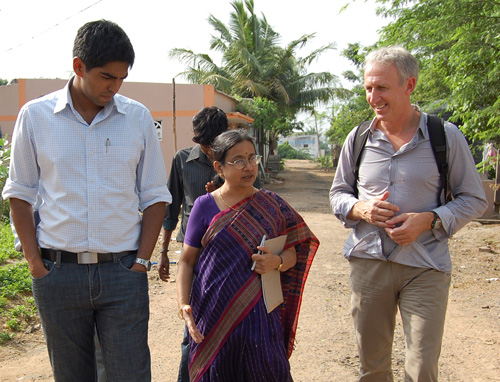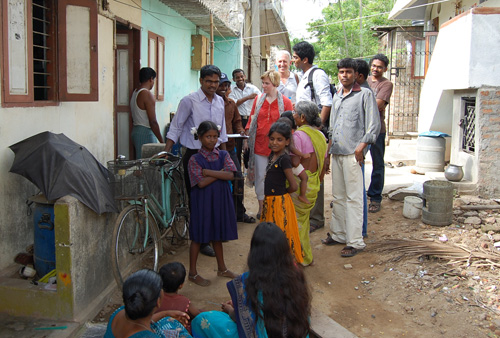
It seems trite to say that working in the slums of India has been a humbling, eye-opening and life-changing experience for Kevin Hall, U of G’s vice-president (research), and PhD students Morgan MacDonald and Syed Imran Ali. But all three find it hard to put into words how they have been affected by the people and situations they’ve encountered in Mylai Balaji Nagar, a resettlement colony near India’s southeastern coastal city of Chennai.
The colony’s residents were evicted from their neighbourhood by the government to make way for a new railway station. Every family received a 15- by 18-foot slab of concrete to turn into a home, but no services or infrastructure. Poverty, hunger and illness are part of everyday life. “Basically, you have 10,000 people living in a space that is the size of a few football fields,” says Hall, a civil engineer and water expert.
Drinking water comes from a lake that collects garbage, raw sewage and debris. It receives little treatment before being piped into “homes” once every week or two. Once there, the water stagnates in open containers.
Water-related illnesses are the slum’s leading cause of sickness and death, especially among children and the elderly.
Hall and his students first visited the slum two years ago. Hoping to improve drinking-water quality and residents’ quality of life, the Guelph trio took worldly experience, know-how and technological expertise. But in a place of few resources and archaic practices, progress has taken on new meaning.
Now they define “technology” differently: what is available, what is cheap, what will be used, and what will work — at least well enough to make a difference. Fold a sari more than 20 times, for instance, and you have a decent water filter, says Hall. “You are able to remove up to 80 per cent of organisms.”
Not only can technology fail to address complex challenges in India, but it can make things worse. As an engineer, Ali says it was hard to get his head around that. For example, that high-tech railroad was built to increase economic productivity, but it displaced thousands of people. “They were forced to leave behind property, jobs, social networks, lives and histories,” he says.

Explaining that social and political forces continually trample rights and lives in the name of progress, Ali says his India experience has made him think about the human impacts of engineering solutions. It has forever shaped the kind of engineer he will be.
MacDonald echoes Ali’s sentiments. As a neuroscientist interested in public health issues, he had already worked in five developing countries, “but nothing truly prepared me for the inequity and hardship experienced by the underserved and disenfranchised people of urban India.”
Both students are now in India full-time; Hall will return there next week. They’re collaborating with the Indian Institute of Technology Madras in Chennai, with funding from the International Development Research Centre.
Working with the slum’s residents, they hope to find efficient, on-the-spot techniques for treating and storing water safely at home. “We’re trying to work with them to improve things, not working to change things. They are the ones who will ultimately use it, so they need to be involved,” Hall says.
The Guelph researchers have held workshops and meetings, attracting mostly women; women do most of the work in the slum. “They really rose to the challenge and were very vocal about what they needed,” Hall says. “It’s been very empowering for them, which has been wonderful to witness.”
Having developed and tested sustainable treatment methods, the U of G team plans to introduce a filter and chlorine disinfection system this month. They’re using multiple outcome measures to assess the effectiveness and appropriateness of each method.
They’re also monitoring children’s health to see whether these systems reduce diarrhea and other water-borne diseases. They hope to apply what works to other urban slums.
Hall says this project is among the most rewarding and perspective-altering work of his career. Earlier he had patented sophisticated water-treatment techniques for use in developed countries. “As I’ve gotten older, I see the world differently; I look at problems differently. I used to focus on high technology, but now about 95 per cent of what I do is humanitarian engineering.”
Both students got involved by chance. MacDonald had made a point of meeting Hall when he was at Queen’s University. He knew they had different academic backgrounds but shared interests in world travel and triathlons. MacDonald also discovered a mutual passion for international development work. The student is now a believer in multidisciplinary collaboration: “Only by joint efforts of engineers, sociologists, geographers, economists and biologists can we ever hope to tackle issues like world hunger and water shortage.”
Ali says it’s been “an intensely exhilarating, frustrating and educational journey.” But he says he’ll be forever grateful: “If I hadn’t stumbled into this project in this place, I wonder if I would have ever come to know what I know now about myself and the world.”